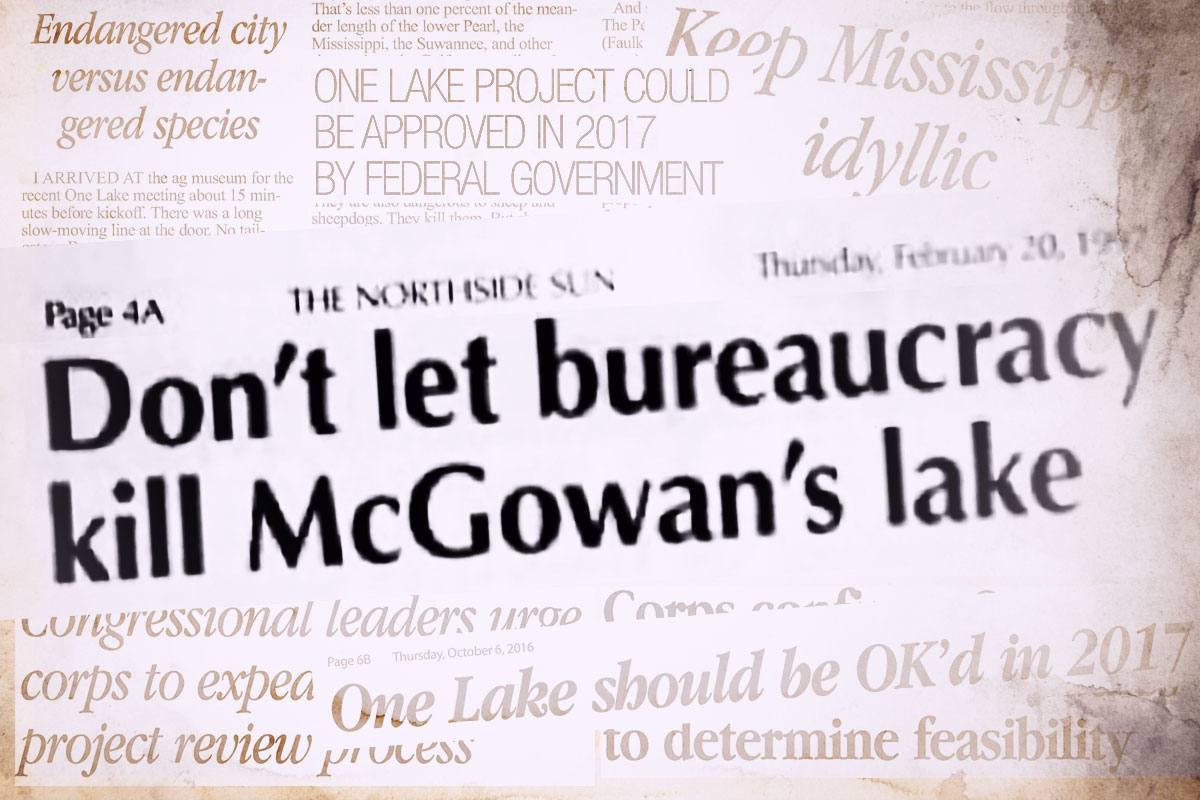A speaker at the U.S. Army Corps of Engineers’ public engagement meeting at Slidell, La., on May 23, 2022, asked: “What makes the One Lake plan the “Locally Preferred Plan?” He was talking about the long-time waterfront development and flood-mitigation strategy that many Jackson-area elected officials, property owners and businessmen have pushed for years as the only possible way to reduce Pearl River flooding.
At first glance, the answer seems obvious. The One Lake plan will allegedly make Jackson great. However, the answer might be a little muddier if we consider the purpose of what will become the congressionally authorized project. It is for reducing flood damages in the Jackson metro, and many of our region’s residents need the help. The Pearl River floods several neighborhoods in Northeast Jackson, and its tributaries flood homes throughout the city.
The One Lake plan will not solve these problems. Yet many of us believe that a plan formulated for real-estate development could also provide optimal flood risk alleviation. We’ve been misled.
Northside Sun’s Unverified Lake Support
Northside Sun owner and publisher Wyatt Emmerich admits that he drank the lake project Kool-Aid from day one. Unfortunately, his newspaper has incessantly fed that Kool-Aid to residents of the Jackson metro for over 26 years and through several versions of the lake plan.
The Northside Sun introduced the original and even more ambitious Two Lakes idea, the brainchild of oilman John McGowan, on Feb. 20, 1997. Two Lakes, very similar to what the same backers would call the Lefleur Lakes project, was the newspaper’s top headline news and had an accompanying editorial calling it “McGowan’s lake.” The project would “eliminate flooding,” according to a glowing report full of “mathematical calculations,” which you could “bet” was “impeccable,” Emmerich’s editorial promised.
Mr. Emmerich did anticipate resistance. A “potential roadblock” was the Environmental Protection Agency, he wrote. The headline article further noted that the U.S. Army Corps of Engineers supported the project but was “forbidden by federal regulations from pursuing” it. The editorial pleaded with the reader: Don’t let the “mammoth” bureaucracy “kill this great idea.”
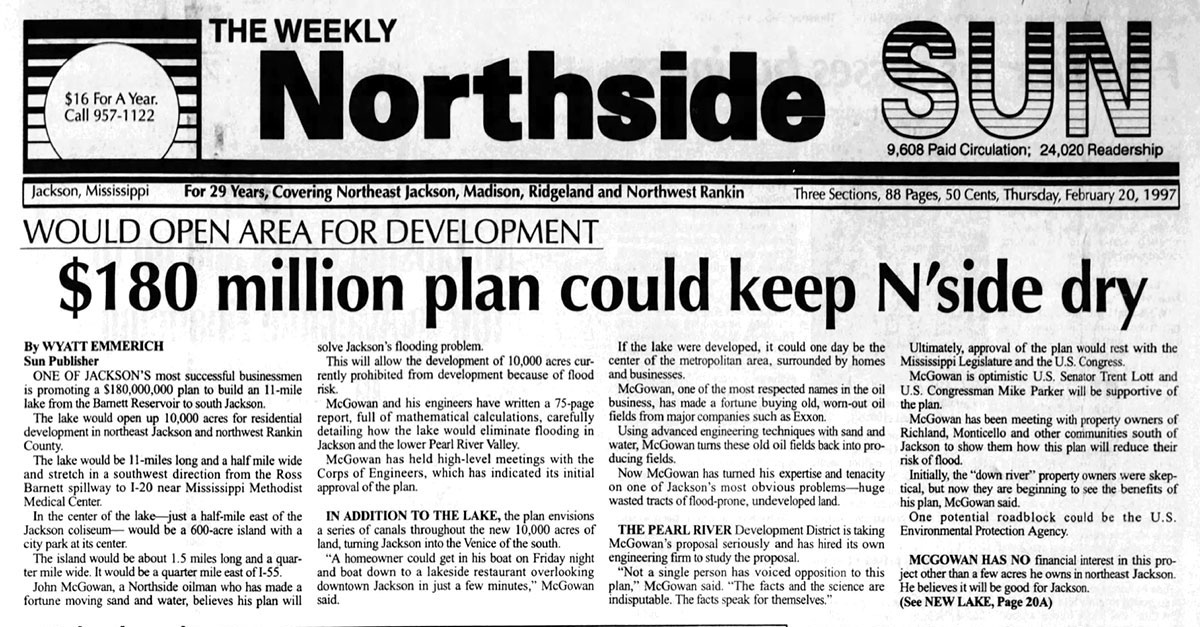
That 1997 issue of the Northside Sun established a pattern. Articles covering the lake projects since then have made unverified, possibly misleading, claims and have often caricatured the opposition as inflexible or pedantic—which continued after the Two Lakes plan was scrapped in late 2009.
The Corps and the Rankin-Hinds Pearl River Flood and Drainage Control District Board (aka the District or the Level Board) killed the LaFleur Lakes proposal, a rebranded version of the Two Lakes plus levees, due to multiple concerns. About a year later, the Northside Sun’s headline introduced the “New Flood Plan,” the One Lake proposal.
The article stated that the plan was a scaled-down version of Two Lakes. Nonetheless, the project would reduce flooding in a 100-year event by at least 96 percent, it promised. It would also “address environmental concerns” since the U.S. Army Corps of Engineers had already excavated the project area.
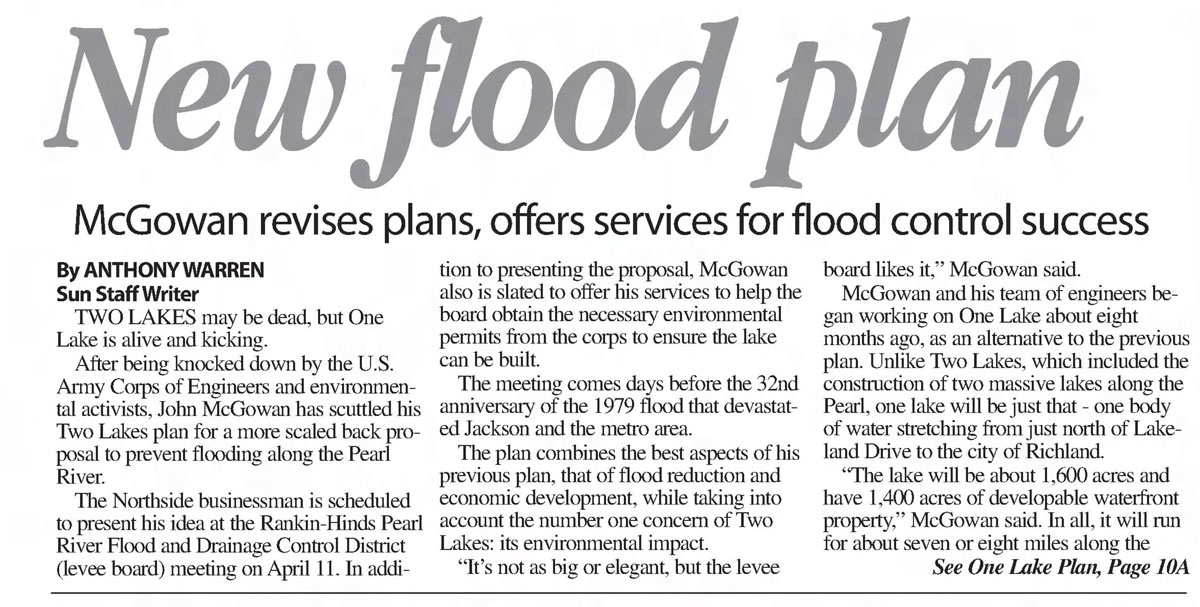
The newspaper repeated this environmental claim 10 times in the following three years. We saw a consequence of this repetition in a March 2012 Northside Sun article when District Board member and Flowood Mayor Gary Rhoads stated, “Common sense tells you that the environmentalists shouldn’t be upset because the (area’s already damaged).”
By October 2016, the newspaper was describing the One Lake as a “compromise between those who wanted to protect the environment, as well as generate new economic growth.” It’s no wonder an op-ed from 2018 characterized the One Lake’s opposition as hysterical, concerned that the sky is falling, and unwilling to accept the compromise.
Propagandistic Claims of ‘Compromise’
To clarify, the previously excavated or channelized section of the Pearl River still contains an ecosystem that further excavation and the construction of a new dam will jeopardize. This destruction is why the U.S. Fish and Wildlife Service’s assessment (see page 29) of the One Lake plan labeled it as the “most environmentally destructive alternative.”
Furthermore, a compromise implies that environmental groups had a say in the plan formulation. They did not.
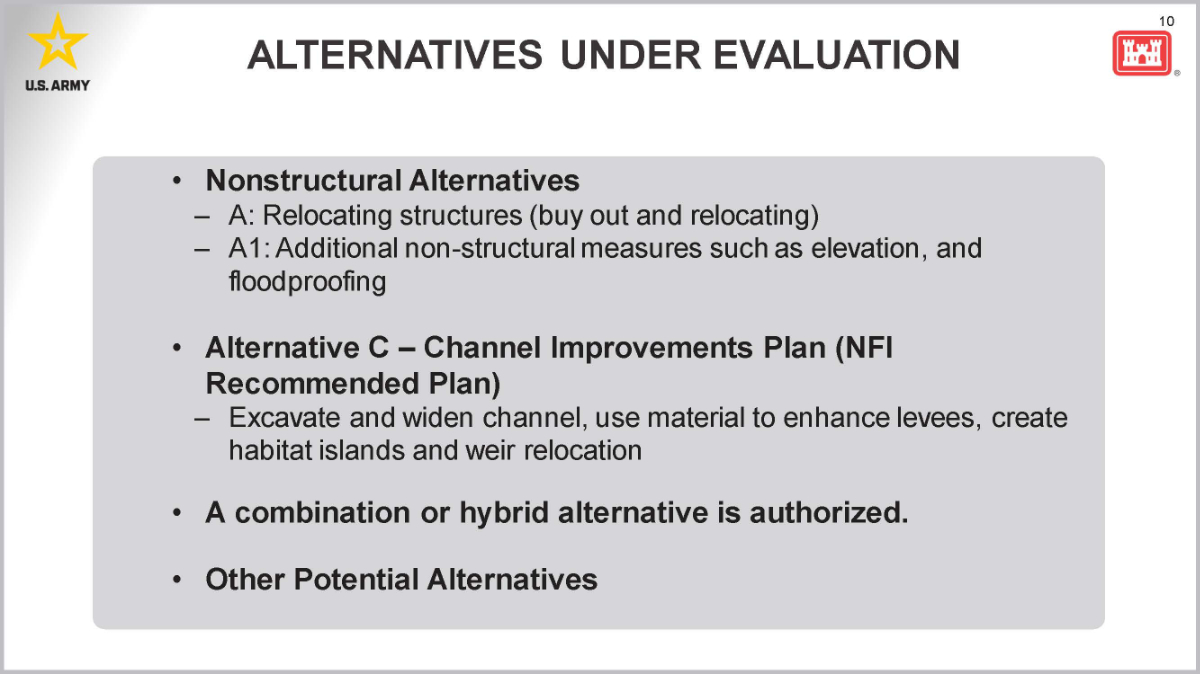
To its credit, the Northside Sun has published some criticisms of the One Lake. A November 2018 op-ed called for an alternative project compatible with “reviving wetlands, pursuing habitat restoration, and providing public access to the Pearl River.” (These are principles of the “One River Plan” submitted by the University of California, Berkeley, an alternative I support. More on that soon.)
However, the Northside Sun’s propagandistic repetition of the “compromise” claim has poisoned the conversation around the One Lake, making it sound like its backers have adequately dealt with important concerns. In September 2022, the newspaper republished an article titled “Efforts in Jackson being made to implement flood control despite opposition.”
Would Lake Really Reduce Flooding by 90 Percent?
Speaking of flood control, we now consider another repeated claim. The Northside Sun has reported in at least 26 articles that the One Lake project would reduce flooding by 90 percent. The newspaper attributes the statistic to a study in six instances. It states the statistic without attribution and, presumably, as a statement of fact in 12 others.
What does it mean to reduce flooding by 90 percent or greater? Most articles do not specify. The Northside Sun articles from Dec. 15 and 22, 2016, suggested that the One Lake plan would protect 95 percent of the properties the 1979 Easter Flood affected. This property claim is verifiable but absent from documents subject to review, namely the 2018 Draft Environmental Impact Statement or the 2020 USACE Agency Technical Review discussions.
Without verification or clarification, the claim is as meaningful as a dealership’s assertion that a car on their lot is 90 percent better. It is a nearly baseless sales pitch that misleads the public.
It is unclear how many people have bought the pitch. Still, supporters like Emmerich openly misinform the public about the flood-protection benefits the One Lake would provide. There were at least three misconceptions stated in support of the project during the May 24 public engagement meetings in Jackson.
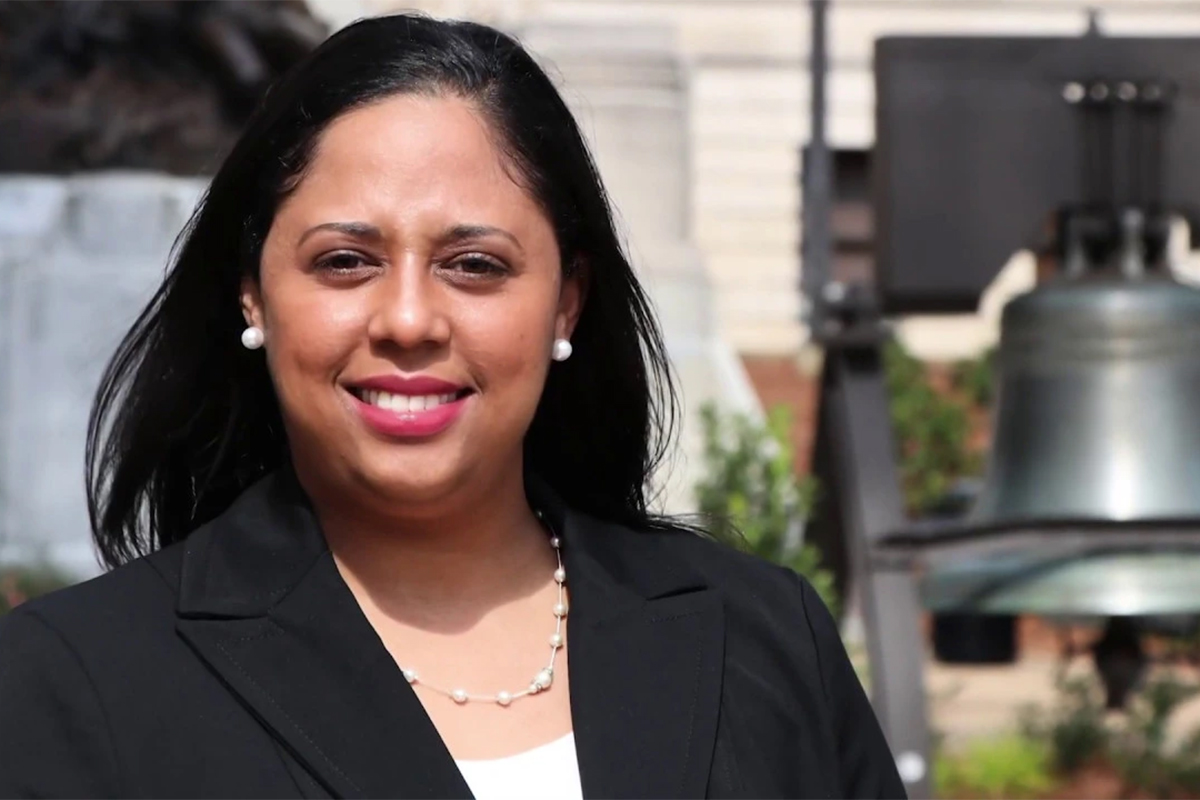
State Rep. Zakiya Summers of Jackson endorsed the project partly because her constituents in West Jackson need protection from flash flooding. However, the One Lake plan reduces flood peaks along the river, which, at best, will only marginally reduce flash-flood risks.
Bishop Ronnie Crudup Sr., pastor of New Horizon Church International, said he endorsed the project because South Jackson residents need protection from river flooding. The One Lake will not address this problem, as explicitly noted by a USACE reviewer in comment 7058837 of the Agency Technical Review (see page 124).
Several speakers supported the project because they believe it would protect predominantly Black communities in Northeast Jackson. However, the One Lake’s 2018 Draft Environmental Impact Statement, specifically Appendix E (see page 16), notes that these communities will continue to flood after implementing the project, albeit with reduced severity.
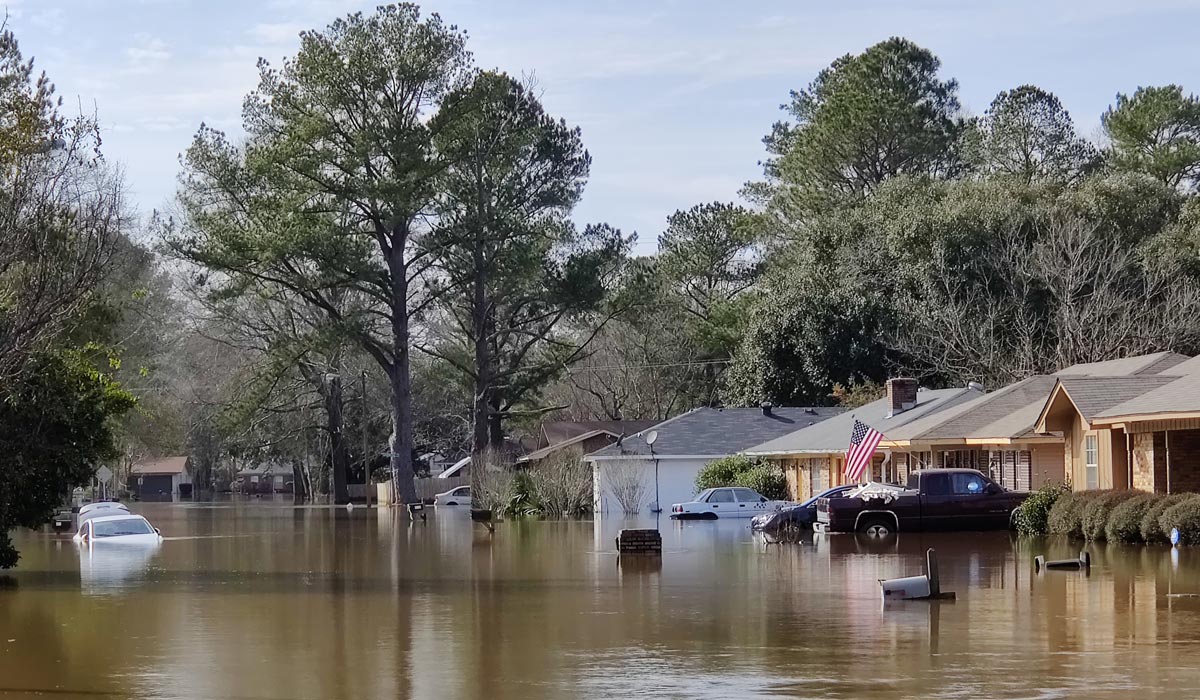
So what makes Alternative C, as the Corps calls “One Lake,” the Locally Preferred Plan? Mischaracterizations and misinformation.
While some Mississippians might justify new developments at the expense of others, some of us want an option that does the most good. The Pearl River Basin Federal Flood Risk Management Project should be optimized toward alleviating flood risks in the Jackson area. A step toward actual consensus is transparency and truthful information.
I will submit this op-ed as part of the public comment period for the Pearl River Basin Federal Flood Risk Management Project, which ends on Friday, June 30. (You can also submit one online or email PearlRiverFRM@usace.army.mil.)
Accordingly, I am including a request to the U.S. Army Corps of Engineers:
On March 6, 1997, Michael Logue, the public affairs chief of the Vicksburg District, called out the “faulty information” in the headline of a Northside Sun article mentioned earlier. It forced the newspaper to publish clarifying statements on that same date. Please step up and address the misinformation surrounding the One Lake plan. You did it before, and it had an impact.
Also see Donna Ladd’s overview of the “One Lake” strategy and opposition downstream here. You can read historic reporting on both Two Lakes and One Lake in the Jackson Free Press’ Pearl River archive.

